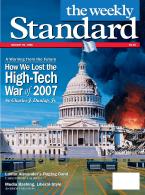It’s well known now that a long-simmering contest for control of the Cato Institute has bubbled over. On the last day of February, Charles and David Koch filed a lawsuit against the widow of former Cato chairman Bill Niskanen, Cato president Ed Crane, and Cato itself seeking to have Niskanen’s shares returned to Cato or granted to the remaining shareholders under the terms of a shareholder agreement. This would give the Kochs (one of whom participated in the founding of Cato) majority ownership, allowing them to elect a majority of Cato’s board. It would also position them to extinguish Crane’s shares so as to gain 100% control.
Cato disputes the Kochs legal positions, and it believes that their success “would swiftly and irrevocably damage the Cato Institute’s credibility as a non-partisan, independent advocate for free markets, individual liberty, and peace.”
The quote just above is from Cato’s “Save Cato” web page, but the more interesting commentary has been scattered by Cato staff and leadership across various blogs and outlets (e.g., Jerry Taylor, Gene Healy, Jason Kuznicki, Julian Sanchez, Jonathan Blanks, Justin Logan, Trevor Burris, Michael Cannon). There has been lots of commentary from many quarters, of course, led by Jonathan Adler at the Volokh Conspiracy. Really, there’s too much commentary to list.
A Facebook page dedicated to “saving” Cato has zoomed past 5,000 supporters.
Now it’s my turn. Putting my thoughts here on TLF is a stretch because I won’t be talking about tech. Think of this as the “liberation” part of Tech Liberation Front. The reason many of my colleagues and I do what we do here is because of both Ed Crane and the Kochs, and the institutions they have built and nurtured. Now these giants in the modern liberty movement are fighting.
That’s a shame for a lot of reasons. There is the overall cause of freedom, of course, our part of which is side-tracked and sullied by the dispute. We Catoites love what we do, fighting for freedom backed by thousands of highly engaged supporters. But don’t go all analytical and forget the hundred-plus Cato staff whose livelihoods and careers are under a cloud. That’s concerning and frustrating, especially for the people with children. Once or twice, I’ve let my colleagues know when I found their arguments overwrought. That personal dimension might be why.
Yes, Cato people are people. And so are Koch people. This is important to surface as part of the theme I want to focus on: miscalculation. Continue reading →



 The Technology Liberation Front is the tech policy blog dedicated to keeping politicians' hands off the 'net and everything else related to technology.
The Technology Liberation Front is the tech policy blog dedicated to keeping politicians' hands off the 'net and everything else related to technology.